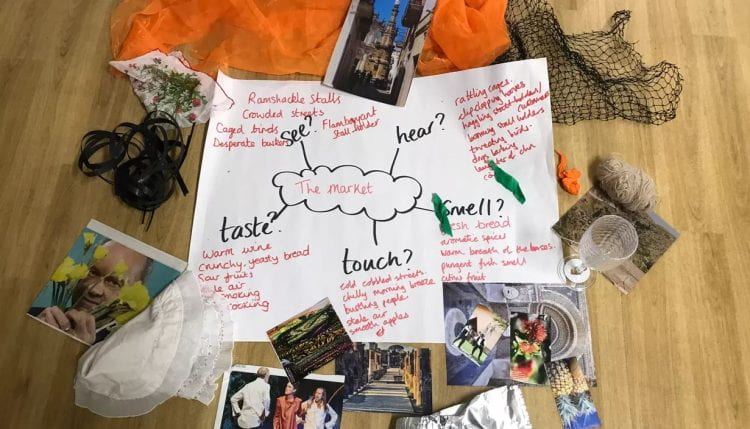
Creative Learning Practices (CLP) – a University of Brighton and National Theatre collaboration
Creative Practices in Primary Education is a research project led by Polly Herbert and Sinead Kennedy from the University of Brighton’s School of Education.

The project was produced in partnership with the National Theatre working alongside the university’s Professor Peter Clough, and also primary teachers, senior managers in education, student teachers, senior lecturers in education and primary aged children.
The project aims to:
- inspire powerful triggers to learning and personal development not only in English but across the whole Primary Curriculum
- develop children’s narrative engagement
- develop oracy, relationships and build self esteem
Phase 1 of the project focussed on ‘An Exploration of the Enablers and Barriers to Implementing Creative Practices in Primary English‘. A Creative Practices Padlet was created as a space and place for our partnership schools to reflect on the CPD and the ways in which they implemented these approaches into their school and share with us as part of the research project.
Sinead said of the project: “It was incredible. I’ve worked with process drama for years as a primary school teacher and a firm believer in this form of playful pedagogy.
“Through phase 1 of this project; seeing our student teachers’ confidences grow and develop using the National Theatre’s approaches they shared on an awe inspiring CPD day; which the students then trialled and planned for on their school placements, was affirming, inclusive and beyond brilliant!”
Jackie Tait at the National Theatre said: “We are so pleased to be able to offer our approaches in this way and work with teachers and student teachers in our collaboration with the University of Brighton. Storytelling and playfulness are at the heart of our work here at the National.”
Project findings
From the evidence of the study, it was concluded that there is ample, really robust and persuasive, lively evidence that:
- the Creative Learning Programme (CLP) has had an inspirational and positive impact on the participating students, the teachers with whom they worked and in a number of cases the wider school culture
- more specifically, the strategies of the CLP support a vibrant literacy environment conducive to learning
- whilst in this instance realised within the English curriculum, participants at all professional levels (students, teachers, headteachers and ITE staff) recognise the relevance and richly generative potential of the strategies across the whole of the wider curriculum; the CLP is crucially about approaches which enable learning readiness for children in all curricular areas
- thus, the strategies are seen – and were applied in some cases – to address the full range of student achievement, within and beyond the curriculum; that is, to and embody a clearly inclusive learning culture
- the CLP has a marked effect on improved and collaborative relationships between students, and between students and their teachers
- whilst barriers to the development of the CLP are to some extent given with current conceptions of literacy in national policies and schools’ realisation of these, the project has shown how it is possible – with appropriate school leadership – thus richly to enhance learning without wholly violating the aims of the National Curriculum
- there is a popular association of the CLP methods mainly if not solely with English and – even more exclusively – Drama; this attribution has a limiting effect on the potential for the use of the strategies across the curriculum.
Project phase 2 testimonials
“Drama has negative connotations for adults, so we avoid doing it, but my class cheer when I say we need to make rehearsal space.”
Teacher
“I guess it’s like physical exploration of the learning role, a learning experience, an experience.”’
Student
“This is just a different way of learning. It’s not this big performance thing. It’s we’re going to learn physically.”
Student
“It’s like embodied learning… and, for me personally, it definitely stays far more ingrained.”
Student
“The training was great and it’s like us all saying, ‘yes, we can change things, we do know this, we know this is how children learn’.”
Head teacher with whole school training
Student evaluation from written assignment
“I found that these strategies vastly effected, not only the children’s engagement within the lesson but also their understanding of the text and their ability to write in role.
“I had many reluctant writers in my class who struggled to begin writing and from different perspective was viewed as a challenge. Their written plan prior to the drama was stunted as they were not embodying the character or using the language reflective of their ability.
“The retelling strategies improved their understanding of the book as a whole, informing their summarisation and the bones of what the needed to include whereas the hot-seating has the deepest effect, providing incomparable insights into the character they previously struggled to understand. From marking all of their work, all children were exhibiting greater depth language and techniques, including those who struggled and lacked enjoyment for English lessons.
“The drama has a visible impact and was rewarding to witness its role in reading and writing.”
Get in touch
If you would like to learn more about the Creative Practices in Primary Education research project contact:
Sinead: s.kennedy@brighton.ac.uk
Polly: p.herbert2@brighton.ac.uk